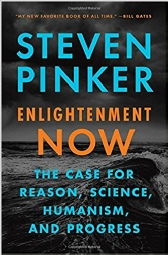



 NEXT
NEXT
 BACK
BACK
 Forum
Forum


Philosophical musings on Quanta & Qualia; Materialism & Spiritualism; Science & Religion; Pragmatism & Idealism, etc.




Post 40. 06/10/2018
Humanism & Deism
Maximizing Human Flourishing
Obviously our rapid technological progression from horse & buggy to Mars landers, is due to the pragmatic methods of Science. But Pinker attributes most of the social & moral progress since the Enlightenment era to the secular worldview of Humanism. He begins this chapter with a summary of the Humanist Manifesto III from 2003. Unlike materialistic Science, the humanist project addresses questions of ethics, morality, and values. He notes that, “Though humanism does not invoke gods, spirits, or souls to ground meaning and morality, it is by no means incompatible with religious institutions. Some Eastern religions, including Confucianism and varieties of Buddhism, always grounded their ethics in human welfare rather than divine dictates. Many Jewish and Christian denominations have become humanistic, soft-
He goes on to assert that Humanism “is a distinctive moral commitment, one that does not come naturally to the human mind. As we shall see, it is vehemently opposed not just by many religious and political factions, but amazingly, by eminent artists, academics, and intellectuals.” The “commitment” he refers to is the primacy of human Reason over Intuition and Tradition. Most Deists can easily dispense with the traditions of men, but some may not like to subordinate their palpable inner feelings to abstract mathematical reasoning. Yet morality requires both innate feelings (via evolution) and the ability (via reason) to deal with clashes between my feelings and those of others. “Much of what we call wisdom consists in balancing the conflicting desires within ourselves, and much of what we call morality and politics consists in balancing the conflicting desires among people.” That balancing act is what I call BothAnd.
By contrast with the divisive dogmas of traditional religions, “History confirms that when diverse cultures have to find common ground, they converge toward humanism.” Since the United States is the epitome of diversity, and of religiosity, some observers have wryly noted that its unofficial national religion, crossing boundaries between sects, is Secular Humanism1. Unfortunately, “the idea that morality consists in the maximization of human flourishing clashes with two perennially seductive alternatives. . . . theistic morality . . . romantic heroism . . .” And he is forced to admit that some secularists argue that theism and romanticism “capture a vital truth about our psychology : that people have a need for theistic, spiritual, heroic or tribal beliefs.” But Pinker believes that human nature can change . . . is changing. So he discusses in some depth a variety of arguments against the desirability & inevitability of agnostic & pragmatic humanism. Many of those same arguments apply to Deism, which is also lacking in absolute divine authority and sentimental romantic appeal.
Post 40 continued . . . click Next

Enlightenment Now
The Case For Reason, Science, Humanism, and Progress
by Steven Pinker, 2018, Cognitive Psychologist
see post 24
Re-
http://bothandblog.enformationism.info/page74.html
See Post 31
Progressophobia
http://bothandblog2.enformationism.info/page9.html
See Post 39
Enlightenment vs Occultism
http://bothandblog2.enformationism.info/page45.html

1. Religious Humanism :
Secular Humanism is the preference of Atheists like Pinker, but some groups like to combine the rational powers of Humanism with the emotional power of religion.
https://en.wikipedia.org/wiki/Religious_humanism
One Protestant pastor’s disparaging description of America’s unofficial religion sounds lot like New Ageism, and Deism.
https://www.crosswalk.com/blogs/dr-
The Supreme Court has even ruled that that “humanism should be treated as a “religion” for purposes of the Equal Protection Clause, which prohibits religious discrimination”.
https://thehumanist.com/commentary/humanism-